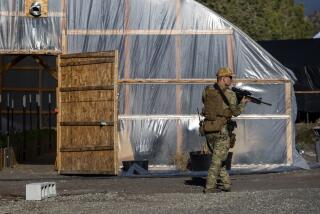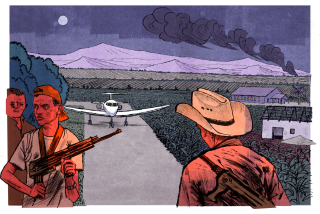Mexican drug lord’s release reopens wounds for victims’ relatives
MEXICO CITY — Keely Walker Muse remembers her dad’s “sloppy” hair, his goofy jokes, the limp from a Vietnam War wound that he comically turned into a strut.
She was 10 in the mid-1980s when John Walker moved his wife, Eve, along with Keely and her younger sister, Lannie, from Minneapolis to Guadalajara, where they thought they could live a little cheaper while John wrote a great American novel.
They were not aware that the city of broad, leafy avenues cowered under the thumb of one of Mexico’s first major drug cartels, run by master trafficker Rafael Caro Quintero. They were not aware they lived around the corner from a U.S. anti-narcotics agent.
Only much later did they realize that their routine trips to the American Consulate to visit the library and to register, as U.S. citizens regularly do, put them in the sights of the drug gang, which was enraged over U.S. Drug Enforcement Administration raids on its vast marijuana fields.
“We just didn’t know,” Keely Walker Muse says.
Walker, then 37, was tortured to death, along with an American friend, by members of Caro Quintero’s gang who apparently mistook them for DEA agents. Just one week later, the actual anti-narcotics agent, Enrique “Kiki” Camarena, was abducted.
The slaying of Camarena in February 1985 proved a seminal event in the drug war, and in prickly U.S.-Mexican relations. Nearly 30 years later, it remains a potent and emotional symbol for American law enforcement.
A Mexican court released Caro Quintero, who was convicted in Camarena’s killing, from prison this month on a technicality after he served 28 years. Mexican government officials expressed dismay, and the U.S. is demanding that he be apprehended and extradited.
But Caro Quintero’s gang also has been implicated in the killings of Walker, his friend Albert Radelat, and two young couples who were Jehovah’s Witnesses. Their stories have been all but forgotten.
They were “collateral damage” in a conflict they scarcely realized was taking place, in the words of Walker’s widow.
For their relatives, Caro Quintero’s release has reopened old wounds. Said Pat Romero, sister of one of the missionaries: “It is a tragic story that doesn’t have an ending.”
Campaign of retaliation
Walker and Radelat, a dental student from Texas who was visiting for a few days, strolled into a mild late-January night in 1985, planning to eat some good seafood at Guadalajara’s La Langosta Loca (The Crazy Lobster) restaurant.
Unbeknown to them, Caro Quintero and his crew were having a private, drug-fueled party inside the restaurant. They branded Walker and Radelat as undercover DEA agents the minute they crossed the threshold, according to witnesses and court testimony.
For three hours in the restaurant’s kitchen, they tortured the two men with ice picks and knives. They took turns beating them bloody. Walker died under the torture; Radelat of a final gunshot to the head.
By that time, the four Jehovah’s Witnesses had been missing for eight weeks.
On the first Sunday in December 1984, two young married couples went “in service” for their faith. That meant walking door to door with pamphlets and magazines and copies of the Bible in hopes of spreading the word.
Ben Mascarenas, Romero’s brother, and his wife, also named Pat, were from Nevada and still in their 20s. They were joined by Dennis and Rose Carlson, who came from the Redding, Calif., area. The Carlsons, in their 30s, had arrived in Guadalajara not two days earlier. The men were described as kind-hearted and reserved, the women more outgoing. Both couples put on their Sunday best and knocked on doors in the upscale Chapalita neighborhood. There they vanished.
Witnesses and investigators said at the time that they appeared to have knocked on the door of Caro Quintero’s senior partner in the drug business, Ernesto Fonseca, known as Don Neto.
At a point when the men and women had separated, gunmen swooped down on the women, shouting, “There they are!” They bundled them into a car and drove off in pursuit of the men. When the husbands saw their wives had been taken at gunpoint, they went along without a struggle.
The young couples might also have been mistaken for DEA agents, according to family and friends who tried desperately for years to piece together what had happened.
A U.S. government investigative report obtained years later by The Times said that on their bosses’ orders, cartel members interrogated the couples, raped the women and then shot all four.
U.S. officials eventually concluded that all six American civilians were killed as part of a campaign of retaliation by Caro Quintero’s cartel against even improbably suspected DEA operatives.
The bodies of Walker and Radelat were found in a shallow grave in a Guadalajara city park about six months after they died. The bodies of the Carlsons and the Mascarenas were never recovered, although longtime friend Phil Ackland said Guadalajara journalists told him the gravesite was eventually located. It was identifiable by copies of Watchtower magazines mixed with human remains, but no one dared to go near.
Frantic search for answers
Eve Walker, now 67, remembers being so out of her element in Guadalajara that when someone first asked whether her husband might have worked for the DEA, she thought to herself: the Dakota Electric Assn. (the power company for part of her home state of Minnesota)?
But when her husband disappeared, she rallied to find him.
She and the girls had returned to the States in 1984. John walker stayed behind to finish that novel, a mystery about an American football team whose star player gets sucked into criminal activities.
Dark-haired John Walker liked the easygoing life of central Mexico. He had worked at small-town newspapers in Iowa and Minnesota. He had done a two-year stint with the U.S. Marines right out of high school, earning two Purple Hearts, one after stepping on a land mine and permanently damaging a leg.
There was nothing military about his bearing, his family recalls, but he did carry a retired-military ID card.
Eve Walker made repeated trips to Guadalajara, pounding the pavement and pounding the doors of Mexican and American officials alike, demanding answers. One Mexican police commander reassured her: Oh, he probably just ran off with a woman. Even the U.S. Consulate officials, she recalls, were callous and dismissive.
“I don’t think they would have finally put any effort [into finding him] if the case hadn’t been connected to Camarena,” she said in an interview from Atlanta, where she and Keely live now. Her voice still cracks with sorrow and anger.
Javier Velasquez Velasco, one of Caro Quintero’s bodyguards, was arrested in Los Angeles in 1989 and convicted two years later on charges connected to the killings of Walker and Radelat. He was sentenced to two life terms.
Eve Walker testified at the trial. She recalled going to the Guadalajara morgue in June 1985 with Radelat’s father, and recognizing the remains of her husband.
“It was only a skeleton, but not just a skeleton,” she testified. “There were parts of his body still on him — one of his eyes, his overlip ... his mustache. It was John. It was, unmistakably, John.”
If the Walkers received a modicum of justice, the families of the Jehovah’s Witnesses couples have not had even that.
The closest they have come was the 1996 arrest in Texas of Ezequiel Godinez, a reputed lieutenant in Caro Quintero’s cartel. Informants told investigators he had participated in the killings of all six Americans and the rape of the women. But U.S. federal prosecutors decided not to pursue charges because of uncertainty over the reliability of the informants, the amount of time that had passed, and the fact that Godinez was already sentenced to decades in jail for other drug-trafficking charges.
“For us, there was no body, no remains, we never had an answer,” said Romero, now 63, speaking from her home in Ely, Nev. Her 86-year-old mother, Mercy Mascarenas, still has nightmares.
“For the longest time, you pray and you pray and you pray,” Romero added. “Then you don’t know what to ask for.”
“I was just saying the other day,” Mascarenas said, “I am going to die with a broken heart.”
Dennis Carlson’s father, Norman, hired a Mexican detective, who quit when he received death threats, family friend Ackland said in a telephone interview from British Columbia, where he is a retired fire inspector. The Carlsons were staying in his apartment in Guadalajara.
“They had a big glorious plan. It was supposed to be exciting, an adventure,” he recalled. “It got out of hand.... There’s no room for innocence down there.”
More to Read
Start your day right
Sign up for Essential California for news, features and recommendations from the L.A. Times and beyond in your inbox six days a week.
You may occasionally receive promotional content from the Los Angeles Times.







